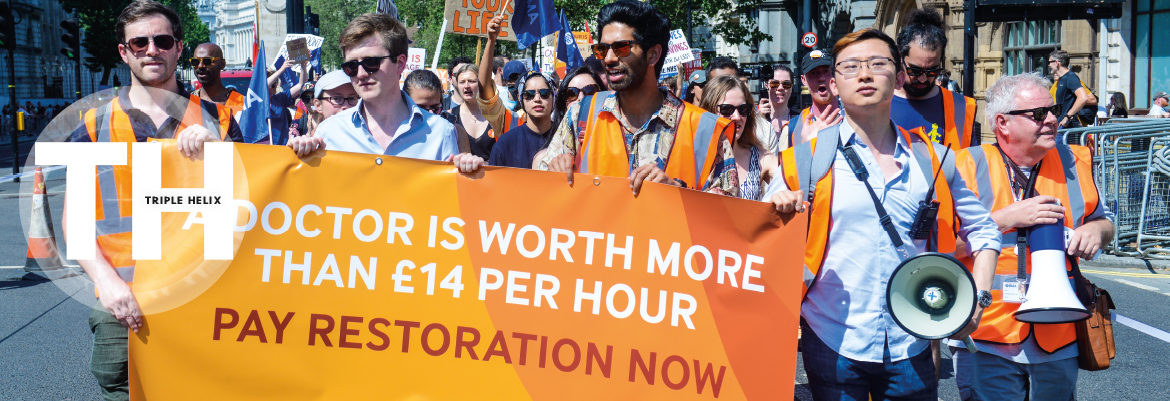Three strikes have already taken place: a 72-hour walkout from Monday 13 to Thursday 16 March; a 96-hour strike from Tuesday 11 to Saturday 15 April, and most recently, another 72-hour strike in June. At time of writing, a five-day walkout is planned in July, followed by a two-day consultants' strike.[5],[6] Estimates reveal that around 172,000 appointments and procedures were cancelled as a result of the first strike and over 196,000 appointments and procedures cancelled for the second.[7] This is in conjunction with a backlog of 7.3 million people waiting for NHS care.[8] So how did we get to this point?
pay restoration
At the heart of this is a dispute between the Government and the BMA over the issue of 'pay restoration'. The BMA argues that pay has been consistently eroded for the past 15 years by 26.1 per cent in real terms - that's a quarter less than our predecessors earned in 2008.[9] With professional fees, exams, courses and conferences to pay for, this has been felt acutely by junior doctors, me included. This is not to mention the current cost-of-living crisis, record-high inflation rates, and preparing to save for a house and starting a family amongst many other considerations.In light of the increased workload, as well as just coming off the back of the coronavirus pandemic, we see a workforce that feels devalued and burnt out with the demands of the profession. A report by the General Medical Council (GMC) in July 2021 shows that a third of trainees felt burnt-out to a 'high or very high degree', three in five felt exhausted at the end of a shift, and 44 per cent found their work emotionally exhausting.[10] I have felt the difficulties of working as an F1 doctor in a busy London hospital in specialties where there are lots of patients with complex needs, many jobs to do, and fast turnovers. I have often returned home utterly exhausted after a long shift. And I say this having worked in the NHS for less than a year.
The combination of the high demands of the profession and the felt inadequacy of pay have caused a significant proportion of doctors to consider leaving or to actually leave the profession or the country.[11],[12] At a time of significant vacancies in the NHS, the profession and the UK public can ill-afford such losses. If junior doctors continue to leave the profession as a result of their perceived devaluation, how much longer can the NHS last?
How one is valued has been at the centre of the argument - 'pay what we're worth' is one of the central arguments. I do think there are some legs to this, even though I do not agree with the underlying assumption of the statement. The assumption is 'how much I'm paid is how much the employer values me'. If the NHS doesn't pay me what is fair, they must have a low valuation of me. And if I am not valued, am I willing to continue to subject myself to immensely difficult working conditions, especially when there are other jobs much better paid and seemingly less stressful, with a better work-life balance? Is it any wonder that junior doctors are quitting medicine?
clash of values
However, this is one of the many places where I find biblical Christianity clashes head-on with the world. One's value should not be contingent on what one is paid. A person working on minimum wage is just as valuable and dignified in the eyes of God as a CEO who earns a seven-figure salary. Both have been made equally in the image of God. And whose valuation of us matters more: our employers or God?I feel somewhat uneasy when speaking to non-medic friends about their thoughts on junior doctors striking, especially knowing some are living 'hand-to-mouth'. Also, having made telephone calls to patients waiting for an appointment and listening to their heart-wrenching stories has weighed heavily on my conscience when contemplating action which causes them to wait even longer.
The Government claim the pay demands are unaffordable and unreasonable compared with other professions' demands. With inflation at 7.9 per cent (CPI at May 2023),[13] a budget deficit of £132 billion forecasted for 2023-24,[14] and a national debt of £2 trillion at the in the financial year ending March 2021, equivalent to 106 per cent of gross domestic product (GDP),[15] the Government must be extremely careful with their expenditure. We also have to consider that several parts of the public sectors are asking for pay rises and the Government cannot be seen to give preferential treatment to one sector above another. So, if they give doctors a 35 per cent raise, how can they not also give all other sectors the same? How much will that cost to the taxpayer and how are the Government going to finance it?
The decision to strike is a personal one and something I and every junior doctor in the UK has had to wrestle with. It has caused me to contact seniors on their thoughts on the matter and the impact it has on patient care. Speaking to my junior doctor colleagues, they look exhausted from the demands of their work schedule, and one can't help feeling compassion for them. They want to have their voices heard and their grievances acknowledged. And yet, there is little or no chance of achieving anything close to their pay demands.
There seems to be a unanimous voice among junior doctors on the pay restoration demand, making it very difficult to hold a different opinion. Deviating from the consensus has felt like an act of betrayal against colleagues and friends. They may very well resent you for it. I also noticed some consultants, although supporting the cause, know this is not a sustainable way forward as they take the brunt of covering for their colleagues. They view this as a noble sacrifice to achieve the bigger cause. How long they can endure this is another question, with indefinite strikes looking probable and no future settlement in sight.
There are no easy answers, but as Christians, we are not unfamiliar of difficult times in our collective history as God's people.[16] We are called to be salt and light in the world at the times of deepest testing.[17] We are to be distinct from the world and let that reflect in the way we think, speak and act.[18],[19] There will be differing views among the CMF membership. Striking is a disputable matter - not commanded or prohibited in Scripture - and, therefore, there must be charity and immense grace to one another if we disagree on this matter.[20] Acknowledge there are good reasons why someone holds the position they do, even if they are in stark contrast to your position. That alone will be a testimony to a world of strife and hostility.[21]
We are commanded to respect authority and not to malign it.[22] Where accusations are flying around, do not be the one to join in and widen the divide. God has instituted the government, whether we like it or not, and therefore out of respect for God, we ought to respect the authority of the government.[23] It is unsettling to see the force of feeling and words used towards the authorities even if there are understandable reasons for it. It has never boded well for a country when its citizens dishonour the governing authorities on the national and international scene.
seek the mind of Christ
It is also incumbent on Christians in the medical sector to think deeply about this issue from biblically and not go along with the crowd. God has put you here in this sector at this particular time, in this particular situation for a purpose.[24] We need to consider patient safety, the longevity of the NHS, the provision of care for the poor and needy, and care of your colleagues, etc. We need to be independent and critical thinkers about this issue.[25] Don't hold a position just because your colleagues and peers are saying the same thing; explore alternative positions.We are to be a people of conviction.[26] We have a positive affirmation at the centre of our faith: Jesus Christ is Lord.[27] If you have come to a position on this issue after careful meditation on the word and through prayer, then stand firm and do not be swayed by intimidation.[28]
Much in Scripture is about spiritual endurance, persevering and holding on when circumstances are tough. Oftentimes in Scripture, the mini-salvations and times of prosperity followed the times of deep hardship. This is what makes our faith precious and real - it stands the umpteen tests that come our way and ultimately it will be satisfied by God according to his righteousness. Our primary hope is that God can do it again, not the Government, nor any other human institution.
To end on a positive note, we are Christ's people and it's an honour to represent Christ in the dark days of our profession. Let us go forth as children of light at a time when the world seems so dark.[29]































